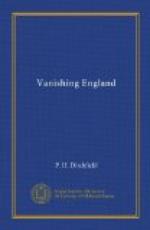The churchwardens’ accounts of St. Mary’s, Thame, and some of the most interesting in the kingdom, are being printed in the Berks, Bucks, and Oxon Archaeological Journal. The originals were nearly lost. Somehow they came into the possession of the Buckinghamshire Archaeological Society. The volume was lent to the late Rev. F. Lee, in whose library it remained and could not be recovered. At his death it was sold with his other books, and found its way to the Bodleian Library at Oxford. There it was transcribed by Mr. Patterson Ellis, and then went back to the Buckinghamshire Society after its many wanderings. It dates back to the fifteenth century, and records many curious items of pre-Reformation manners and customs.
From these churchwardens’ accounts we learn how our forefathers raised money for the expenses of the church and of the parish. Provision for the poor, mending of roads, the improvement of agriculture by the killing of sparrows, all came within the province of the vestry, as well as the care of the church and churchyard. We learn about such things as “Gatherings” at Hocktide, May-day, All Hallow-day, Christmas, and Whitsuntide, the men stopping the women on one day and demanding money, while on the next day the women retaliated, and always gained more for the parish fund than those of the opposite sex: Church Ales, the Holy Loaf, Paschal Money, Watching the Sepulchre, the duties of clerks and clergymen, and much else, besides the general principles of local self-government, which the vestrymen carried on until quite recent times. There are few books that provide greater information or more absorbing interest than these wonderful books of accounts. It is a sad pity that so many have vanished.
The parish register books have suffered less than the churchwardens’ accounts, but there has been terrible neglect and irreparable loss. Their custody has been frequently committed to ignorant parish clerks, who had no idea of their utility beyond their being occasionally the means of putting a shilling into their pockets for furnishing extracts. Sometimes they were in the care of an incumbent who was forgetful, careless, or negligent. Hence they were indifferently kept, and baptisms, burials, and marriages were not entered as they ought to have been. In one of my own register books an indignant parson writes in the year 1768: “There does not appear any one entry of a Baptism, Marriage, or Burial in the old Register for nine successive years, viz. from the year 1732 till the year 1741, when this Register commences.” The fact was that the old parchment book beginning A.D. 1553 was quite full and crowded with names, and the rector never troubled to provide himself with a new one. Fortunately this sad business took place long before our present septuagenarians were born, or there would be much confusion and uncertainty with regard to old-age pensions.




